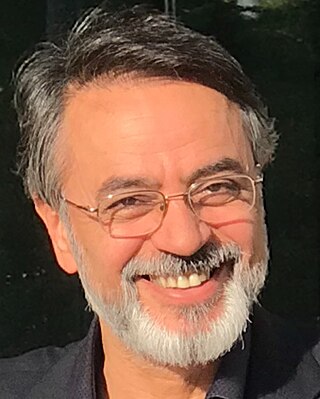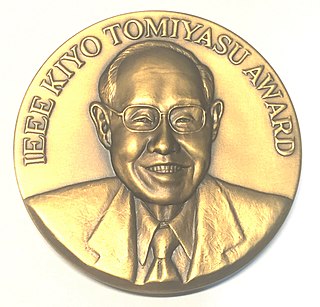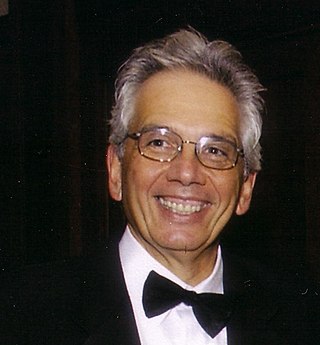
Robert Gray Gallager is an American electrical engineer known for his work on information theory and communications networks.
Hamid Jafarkhani is an Iranian-born American electrical engineer and professor. He serves as the Chancellor's Professor in electrical engineering and computer science in the Henry Samueli School of Engineering at the University of California, Irvine. His research focuses on communications theory, particularly coding and wireless communications and networks.

Gerard Joseph Foschini, was an American telecommunications engineer who worked for Bell Laboratories from 1961 until his retirement. He died in September 2023. His research has covered many kinds of data communications, particularly wireless communications and optical communications. Foschini has also worked on point-to-point systems and networks.

Siavash Alamouti is an Iranian-born business executive, and entrepreneur. and electrical engineer. He is the Executive Vice President of Innovation R&D at Wells Fargo, and the executive chairman of Mimik Technology, Inc. He is known for the 1998 invention of the Alamouti's code, a type of space–time block code.

Jawad A. Salehi, IEEE Fellow & Optica Fellow, born in Kazemain (Kadhimiya), Iraq, on December 22, 1956, is an Iranian electrical and computer engineer, pioneer of optical code division multiple access (CDMA) and named Highly Cited Researcher. He is also a board member of Academy of Sciences of Iran and a fellow of Islamic World Academy of Sciences. He was also elected as a member of Iranian Science and Culture Hall of Fame in Electrical Engineering, October 2010.

Tingye Li was a Chinese-American scientist in the fields of microwaves, lasers and optical communications. His innovative work at AT&T pioneered the research and application of lightwave communication, and has had a far-reaching impact on information technology for over four decades.

Ian F. Akyildiz is a Turkish-American electrical engineer. He received his BS, MS, and PhD degrees in Electrical and Computer Engineering from the University of Erlangen-Nürnberg, Germany, in 1978, 1981 and 1984, respectively. Currently, he is the President and CTO of the Truva Inc. since March 1989. He retired from the School of Electrical and Computer Engineering (ECE) at Georgia Tech in 2021 after almost 35 years service as Ken Byers Chair Professor in Telecommunications and Chair of the Telecom group.
Moe Z. Win is a Burmese-American mathematician and electrical engineer known for his work in wireless communications. He is currently a professor at the Massachusetts Institute of Technology.
Imrich Chlamtac was born in Zlaté Moravce, Slovakia, where in 2015, he received an Honorary Citizenship. Professor Chlamtac is the President of EAI, the European Alliance For Innovation., a private non-profit organization hosting conferences Through its international presence and being the largest European professional community in information technologies and their applications, EAI is dedicated to making information technologies a catalyst for the improvement of society, to advance worldwide research communities and help professionals build their career in an open, innovative community driven environment. As Founding President of CREATE-NET, he led the organization to international recognition as one of the leading European research organizations in communications.

The IEEE Kiyo Tomiyasu Award is a Technical Field Award established by the IEEE Board of Directors in 2001. It is an institute level award, not a society level award. It is presented for outstanding early to mid-career contributions to technologies holding the promise of innovative applications. The prize is sponsored by Dr. Kiyo Tomiyasu, the IEEE Geoscience and Remote Sensing Society, and the IEEE Microwave Theory and Techniques Society (MTT).
Robert Arno Scholtz is a distinguished professor of electrical engineering at University of Southern California, known for ultra-wideband and spread spectrum communications.
Robert W. Brodersen was a professor emeritus of electrical engineering, and a founder of the Berkeley Wireless Research Center (BWRC) at the University of California, Berkeley.

Chai Keong Toh is a Singaporean computer scientist, engineer, industry director, former VP/CTO and university professor. He is currently a Senior Fellow at the University of California Berkeley, USA. He was formerly Assistant Chief Executive of Infocomm Development Authority (IDA) Singapore. He has performed research on wireless ad hoc networks, mobile computing, Internet Protocols, and multimedia for over two decades. Toh's current research is focused on Internet-of-Things (IoT), architectures, platforms, and applications behind the development of smart cities.

Harold Vincent Poor is the Michael Henry Strater University Professor of Electrical Engineering at Princeton University, where he is also the Interim Dean of the School of Engineering and Applied Science. He is a specialist in wireless telecommunications, signal processing and information theory. He has received many honorary degrees and election to national academies. He was also President of IEEE Information Theory Society (1990). He is on the board of directors of the IEEE Foundation.
Dr. Hui Liu is a Chinese American professor and an entrepreneur in the field of wireless and satellite communications. He is a prolific researcher with more than 200 scholarly articles and 2 textbooks, and a creative innovator with 67 awarded patents in areas ranging from wireless systems, signal processing, satellite networks, to machine learning. He has more than 12,000 paper citations and an H-index of 56 as of 2018. Dr. Liu is also one of the principal designers of three industrial standards on cellular networks, terrestrial broadcasting, and satellite communications, respectively.
Theodore (Ted) Scott Rappaport is an American electrical engineer and the David Lee/Ernst Weber Professor of Electrical and Computer Engineering at New York University Tandon School of Engineering and founding director of NYU WIRELESS.

Biswanath Mukherjee is an Indian-American Distinguished Professor of computer science at University of California, Davis. He is also a fellow of IEEE for contributions to architectures, algorithms, and protocols for optical networks.

Richard D. Gitlin is an electrical engineer, inventor, research executive, and academic whose principal places of employment were Bell Labs and the University of South Florida (USF). He is known for his work on digital subscriber line (DSL), multi-code CDMA, and smart MIMO antenna technology all while at Bell Labs.
Zorana B. (Zoya) Popović is a Yugoslav-American electrical engineer, a distinguished professor and Lockheed Martin Endowed Chair in RF Engineering in the Department of Electrical, Computer and Energy Engineering at the University of Colorado Boulder. Her research involves radio and microwave engineering, including wireless communication, millimeter wave scanners, radio frequency power transmission, and the use of rectennas to harvest radio-frequency energy.
Leslie Ann Rusch is an American and Canadian electrical engineer whose research interests include optical communication, edge computing, spread spectrum techniques, flexible antenna arrays, and wireless brain implants. She is a professor of electrical and computer engineering at the Université Laval in Quebec City, where she holds a tier 1 Canada Research Chair in Communications Systems Enabling the Cloud and the NSERC/Huawei Industrial Research Chair in Fibre Optic Communications Systems.










